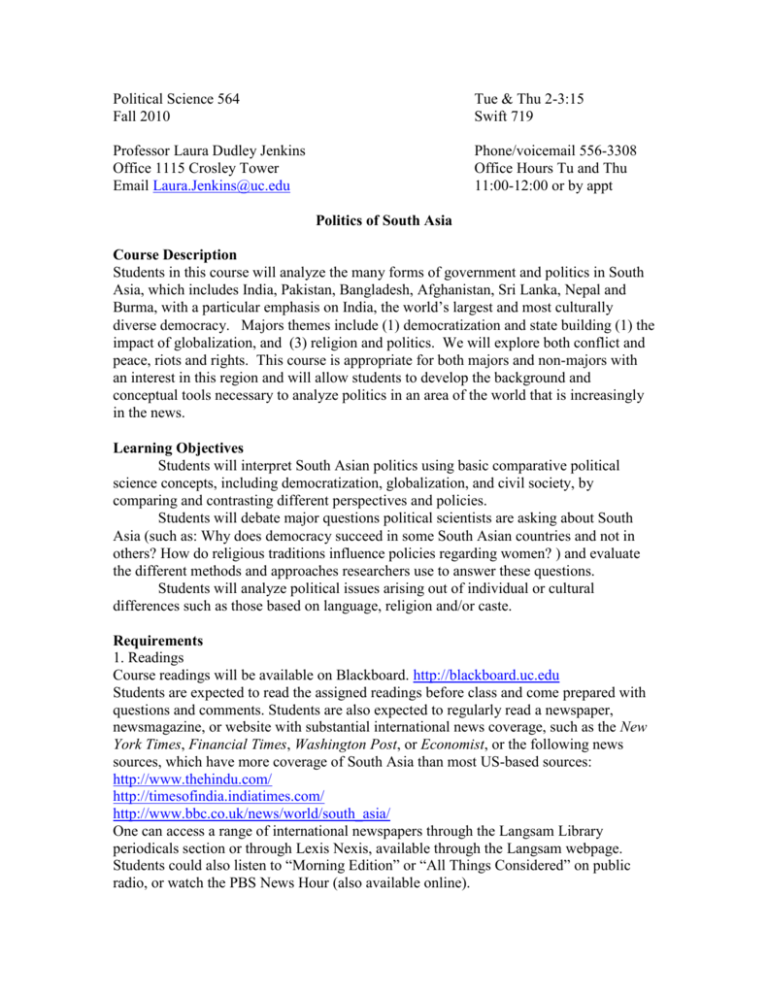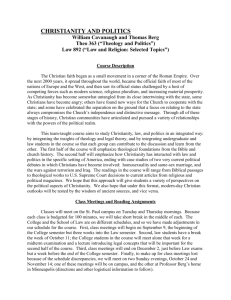Political Science 564 - University of Cincinnati
advertisement

Political Science 564 Fall 2010 Tue & Thu 2-3:15 Swift 719 Professor Laura Dudley Jenkins Office 1115 Crosley Tower Email Laura.Jenkins@uc.edu Phone/voicemail 556-3308 Office Hours Tu and Thu 11:00-12:00 or by appt Politics of South Asia Course Description Students in this course will analyze the many forms of government and politics in South Asia, which includes India, Pakistan, Bangladesh, Afghanistan, Sri Lanka, Nepal and Burma, with a particular emphasis on India, the world’s largest and most culturally diverse democracy. Majors themes include (1) democratization and state building (1) the impact of globalization, and (3) religion and politics. We will explore both conflict and peace, riots and rights. This course is appropriate for both majors and non-majors with an interest in this region and will allow students to develop the background and conceptual tools necessary to analyze politics in an area of the world that is increasingly in the news. Learning Objectives Students will interpret South Asian politics using basic comparative political science concepts, including democratization, globalization, and civil society, by comparing and contrasting different perspectives and policies. Students will debate major questions political scientists are asking about South Asia (such as: Why does democracy succeed in some South Asian countries and not in others? How do religious traditions influence policies regarding women? ) and evaluate the different methods and approaches researchers use to answer these questions. Students will analyze political issues arising out of individual or cultural differences such as those based on language, religion and/or caste. Requirements 1. Readings Course readings will be available on Blackboard. http://blackboard.uc.edu Students are expected to read the assigned readings before class and come prepared with questions and comments. Students are also expected to regularly read a newspaper, newsmagazine, or website with substantial international news coverage, such as the New York Times, Financial Times, Washington Post, or Economist, or the following news sources, which have more coverage of South Asia than most US-based sources: http://www.thehindu.com/ http://timesofindia.indiatimes.com/ http://www.bbc.co.uk/news/world/south_asia/ One can access a range of international newspapers through the Langsam Library periodicals section or through Lexis Nexis, available through the Langsam webpage. Students could also listen to “Morning Edition” or “All Things Considered” on public radio, or watch the PBS News Hour (also available online). 2. Response Papers Students will write 1-2 page, typed, double-spaced papers responding to the assigned readings. Half of the class will write papers on the readings assigned on Tuesdays. These papers are to be posted to Blackboard by the day before class (Monday) at noon. The other half of the class will write papers on each Thursday’s readings. These papers are to be posted to blackboard by the day before class (Wednesday) at noon. No late papers. No papers for readings on 11/2, 11/4, 11/30, 12/2. Undergrads write 7 total out of the 8 opportunities to write response papers (marked on the schedule of readings). In other words, undergrads can pick one response paper to skip with no penalty. For the weeks with Thursday holidays (Veteran’s Day and Thanksgiving), all students write responses to Tues readings. Grads write 10 papers. 3. Individual research project (graduate students only). See me (soon). 8-10 pages, 10 sources, including some academic journal articles 4. Exam Exam on readings, lectures and class discussions will be essay exam. Advice on taking an essay exam: http://www.indiana.edu/~wts/pamphlets/essay_exam.shtml Final Exam: Thu Dec 9, 4-6 pm Grades will be determined on the following basis Undergraduate students 1/2 response papers (7), class discussion 1/2 final exam Graduate students 1/3 response papers (10), discussion 1/3 research paper 1/3 final exam Be aware of the withdrawal deadlines. There will be no makeup exams. If there are extraordinary (medical) circumstances and arrangements are made with the professor prior to the exam, an alternative test may be given to compensate for that portion of the grade. This syllabus is subject to modification. Some of the topics covered are controversial and can evoke strong opinions. In this class all points of view will be listened to and respectfully considered. The University Rules, including the Student Code of Conduct, and other documented policies of the department, college, and university related to academic integrity will be enforced. Any violation of these regulations, including acts of plagiarism or cheating, will be dealt with on an individual basis according to the severity of the misconduct. It is each student's responsibility to know and comply with the Student Code of Conduct, which defines behavior expected of all University of Cincinnati students and behavior considered misconduct. Sanctions and penalties are outlined. The Code of Conduct is available in the college office and online at http://www.uc.edu/studentlife/conduct/conduct.html Definitions of cheating, plagiarism, and penalties are in the Code of Conduct. The definition of plagiarism includes, but is not limited to: copying another student's work, copying materials without proper citation, paraphrasing without proper citation and failing to cite all sources used and/or consulted. Examples and guidance can be reviewed at the following site: http://www.indiana.edu/~wts/pamphlets/plagiarism.shtml If you have any special needs related to your participation in this course, including identified visual impairment, hearing impairment, physical impairment, communication disorder, and/or specific learning disability that may influence your performance in this course, you should meet with the instructor to arrange for reasonable provisions to ensure an equitable opportunity to meet all requirements of this course. At the discretion of the instructor, some accommodations may require prior approval by Disability Services. The State and Democracy in South Asia Thu 9/23 Introduction TuRP=Tuesday response paper ThRP=Thursday response paper Tue 9/28 Failed State? Afghanistan TuRP#1 Pankaj Mishra. “Afghanistan: Communists, Mullahs, and Warlords” in his Temptations of the West. New York: Farrar, Straus, and Giroux, 2006. Thu 9/30 Postcolonial states and Partition: Pakistan and India ThRP#1 Guest lecture on Kashmir and Indian and Pakistani nationalism: Harita Patel Stephen Philip Cohen. “The State of Pakistan” in his Idea of Pakistan. Delhi: Oxford, 2004. Selections from “Approaching Pakistan,” American Abroad Media (in class) Tue 10/5 Democracy in India, Sri Lanka and Pakistan TuRP#2 Katherine Adeney and Andrew Wyatt “Democracy in South Asia: Getting beyond the structure-agency dichotomy.” Political Studies 52 (1) p.1-18 (March 2004). Thu 10/7 Democratizing State: Nepal ThRP#2 Pratima Upadhyay. “The Struggle for LGBTI Rights in Nepal: A Case Study of the Blue Diamond society,” MA project, WGSS Department, UC, 2010. Tue 10/12 Authoritarian rule in Burma/Myanmar TuRP#3 “Mandalay” from Finding George Orwell in Burma. Pricilla Clapp. “Burma’s long road to democracy.” United States Institute of Peace, 2007. Globalization in South Asia Thu 10/14 Globalization and trade ThRP#3 Amartya Sen. “How to judge Globalism.” In Mark Kesselman, ed. The Politics of Globalization. Houghton Mifflin, 2007. Sandhya Hewamanne. Stitching Identities in a free trade zone: gender and politics in Sri Lanka. Philadelphia: University of Pennsylvania Press, 2008. Tue 10/19 Globalization and labor rights TuRP#4 Farzad R. Khan et al. “A Dark side of institutional entrepreneurship: Soccer balls, child labour and postcolonial impoverishment. Organization Studies 28 (2007). Pp. 1055-1077. Thu 10/21 Globalization and outsourcing ThRP#4 Jagdish Bhagwati “In defense of globalization.” In Mark Kesselman, ed. The Politics of Globalization. Houghton Mifflin, 2007. Amrita Pande “’At least I am not sleeping with anyone’: Resisting the Stigma of Commercial Surrogacy in India.” Feminist Studies 36, 2 (summer 2010). Tue 10/26 Globalization and ecofeminism TuRP#5 Vandana Shiva. “Stolen Harvest” In Mark Kesselman, ed. The Politics of Globalization. Houghton Mifflin, 2007. Suketu Mehta. “A big stretch.” New York Times, May 7, 2007. Thu 10/28 Globalization of human rights ThRP#5 “The right to be human: Dilemmas of rights-based programming at CARE-Bangladesh” Tue 11/2 Globalization of human rights, cont. NoRP “The Right to be human: Dilemmas of rights-based programming in CARE-Bangladesh” Thu 11/4 NO MIDTERM and NO CLASS and NoRP (Grad students: draft your research papers, and give me your drafts next week for feedback.) Religion and Politics in South Asia Tue 11/9 Hindu-Muslim conflict Tu&ThuRP #6 Meera Seghal. “Manufacturing a feminized siege mentality: Hindu nationalist paramilitary camps for women in India.” Journal of Contemporary Ethnography 36(2) April 2007, p. 165-183.. Thu 11/11 Veteran’s Day – UC closed Tue 11/16 Ethno-religious nationalism abroad TuRP#7 “The Sri Lankan Tamil Diaspora after the LTTE,” International Crisis Group, 2010. Thu 11/18 India’s “lost tribes” of Judaism ThuRP#7 James Scott. The Art of Not Being Governed. Yale University Press, 2009. Tue 11/23 Caste, Buddhism and empowerment Tu&ThRP#8 Narendra Jhadav. Untouchable. Thu 11/25 Thanksgiving – UC closed Tue 11/30 Law and Islam NoRP Shah Bano: Muslim women’s rights http://oz.uc.edu/thro Thu 12/2 Debate and review NoRP Thu 12/9 Final Exam 4-6 pm




